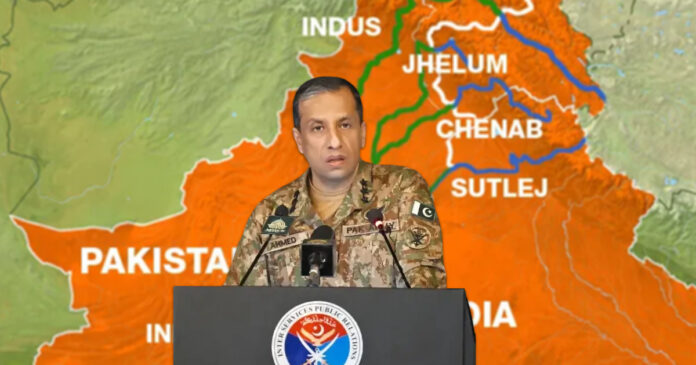Director General of Inter-Services Public Relations (DG ISPR) Lieutenant General Ahmed Sharif Chaudhry has strongly rejected Indian Prime Minister Narendra Modi’s claim that India could stop Pakistan’s water. In an interview with Al Jazeera, he called this idea “insane thinking.”
“Only a mad person can think that India can stop Pakistan’s water. It is not possible to cut off water for 240 million people,” he said. Modi had earlier stated that Pakistan would not receive water from rivers over which India claims rights. His comment came a month after a deadly attack in Indian Illegally Occupied Jammu and Kashmir (IIOJK), which led India to suspend the Indus Waters Treaty (IWT).
Kashmir’s Water Rights and Territorial Dispute
General Chaudhry noted that six rivers originate from Kashmir, a region recognised as disputed by the United Nations. “If the people of Kashmir decide to join Pakistan, all those rivers will belong to us, making India a lower riparian state,” he explained. “At that point, it will be for Pakistan to decide how to deal with that situation.”
The Indus Waters Treaty, brokered by the World Bank in 1960, was unilaterally suspended by India following the April 22 attack that killed 26 people, mostly Hindu tourists, in IIOJK.
Unity of the People and Pakistan’s Stand on Truth
Lt Gen Chaudhry highlighted the unity and resilience of the Pakistani people. “If you go into the streets and cities of Pakistan, you will find the answer written on the faces of the people,” he said. According to him, this conflict is not just military or political, but a fight for truth and principles. Calling Pakistan’s stance a just struggle, he said India used falsehoods and coercion to shape a narrative after the Pahalgam incident.
“In response, Pakistan made one simple demand: if you have evidence, bring it forward,” he said. “If there is any proof connecting a Pakistani citizen or the state to the incident, present it — not just to us, but to the international community or a neutral and trusted third party, so that transparent investigations can take place.”
India has not responded to this demand. “India had no answer then, and it still has none,” he added, noting that India’s Ministry of External Affairs recently admitted that the investigation is still ongoing.
Cross-Border Strikes and Pakistan’s Response
Lt Gen Chaudhry also commented on the missile strikes India launched on May 6 and 7. India claimed these were aimed at militant camps in retaliation for the Pahalgam attack. However, the strikes killed several Pakistani civilians, including women and children.
In response, Pakistan launched Operation Bunyan-ul-Marsoos, targeting Indian military facilities in several regions. The Pakistan Air Force shot down six Indian fighter jets, including three Rafales and dozens of drones. After 87 hours of fighting, a ceasefire was brokered by the United States on May 10.
The DG ISPR pointed out that India has a more developed film and media industry, which it uses to create and push false narratives. He reiterated that Pakistan has not used the full force of its conventional military yet, as it remains focused on countering terrorism, particularly operations in Balochistan and Khyber Pakhtunkhwa, supported by India.
India Accused of Sponsoring Terrorism
“The world knows that India is the biggest sponsor of terrorism in this region,” he said. He made it clear that Pakistan continues these anti-terror operations without withdrawing any troops. He warned of the dangers of a conflict between two nuclear-armed states.
“Global powers understand that even imagining a war between two nuclear states is both dangerous and ridiculous,” he added. “India has been obsessed with war for years, which is like playing with fire.”
Lt Gen Chaudhry said India is creating conditions that could lead to mutual destruction. On the other hand, Pakistan has acted responsibly to avoid escalating the situation.
He raised serious concerns about human rights in India, stating, “The Indian elite believes in oppressing Muslims and minorities, which is a serious issue.” He explained that Christians, Sikhs, and lower-caste Hindus also face persecution.
“This oppression naturally triggers a reaction,” he said, “but instead of addressing the root causes, India refuses to deal with the issues and blames Pakistan.” He called this a result of extremism and the Hindutva ideology, which seeks to shift internal Indian problems outward.
He also denied India’s accusation that Pakistan targeted a religious site like the Golden Temple. He called it “the greatest lie.” He emphasised Pakistan’s commitment to protecting Sikh religious sites like Nankana Sahib, Panja Sahib and Kartarpur Sahib.
“Attacking religious or civilian sites is against our culture, our values, and our religion,” he said. “We love our Sikh brothers, and there are deep bonds between Muslims and Sikhs in Pakistan.”
Warning of Stronger Response If Provoked Again
Lt Gen Chaudhry said Pakistan has fought this war independently and expects India to do the same. “If India has any self-respect, it should also fight its own battles,” he added. He urged Indians to stop depending on falsehoods and aggression.
He stressed that Pakistan remained firm during the recent conflict and will continue to do so. “If India tries this again, our reaction will be swifter and more severe than before,” he concluded.
Stay tuned to Brandsynario for the latest news and updates






































